Kaito is killing attention
Kaito is an addictive casino game, but this narrative will eventually fade away.
Kaito is an addictive casino game, and this narrative will eventually fade away.
Written by: The Smart Ape
Translated by: AididiaoJP, Foresight News
I recently came across a quote from Herbert Simon: "A wealth of information creates a poverty of attention."
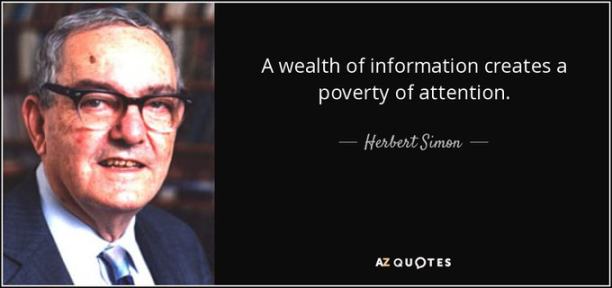
This quote is from 1971, and as time goes by, it becomes increasingly true.
Through @KaitoAI, attention is transformed into a currency, and the value of content is measured and converted into Yaps, i.e., mindshare.
But there is a paradox behind this: in the process of trying to focus and monetize attention, we may actually be consuming attention uncontrollably—in other words, attention is killing attention.
Background
Recent studies show that the average attention span in front of a screen has dropped to about 50 seconds, whereas in the early 2000s, it was 2 minutes.
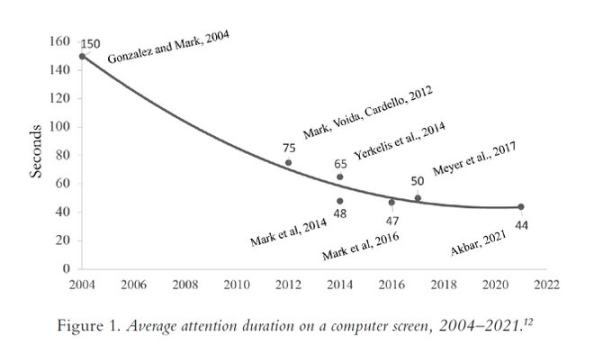
After each interruption, it takes an average of about 23 minutes to re-enter a state of deep focus.
This data suggests that the more we try to capture attention by increasing information and signals, the more we actually weaken it.
Psychologists call this phenomenon "directed attention fatigue." It is the exhaustion that occurs when the brain must continuously filter out distractions to maintain focus.
The Psychology of Attention
There are many psychological studies and paradoxes about attention.
Charles Goodhart once said: "When a measure becomes a target, it ceases to be a good measure."
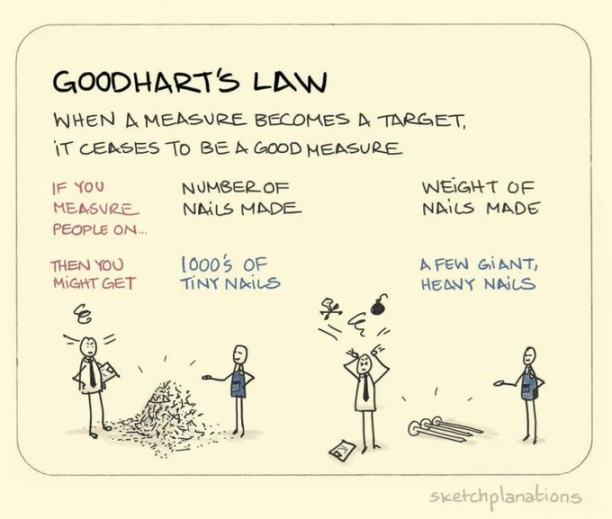
Kaito's goal is to set up a reward mechanism by measuring attention. But once attention itself becomes the target, Kaito's measurement loses its meaning.
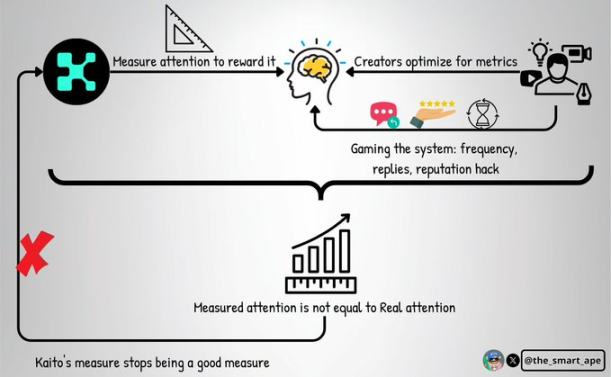
There is also a wealth of research showing that when external rewards replace intrinsic motivation, creativity and genuine engagement decline. In Kaito's case, the rewards clearly reduce authenticity.
What makes it unique is that Kaito's reward system is highly addictive, much like a casino game.
It keeps creators engaged, but also leads to fatigue and dependency, thereby weakening collective attention.
Kaito's Promise
It's not surprising that Kaito is addictive for creators; it distributes considerable rewards through a gamified experience. Kaito has distributed over $110 millions to more than 200,000 wallets (excluding its own airdrop).
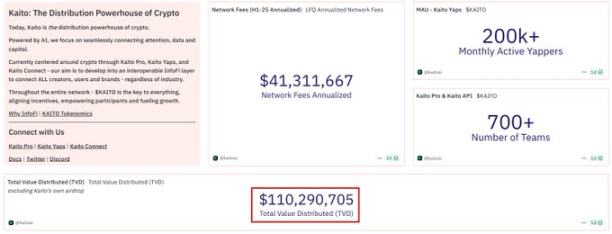
Some events have allowed individual creators to earn over $200,000.
But it is precisely this scale of incentives that is killing attention. With so much money and rewards at stake, creators are forced to optimize posting frequency, reply strategies, and interaction tactics, rather than cultivating habits of deep thinking.
On top of that, the lifespan of a post on X is only about 80 minutes, after which engagement drops sharply. This brings additional pressure for high-frequency posting. Some creators have posted over 200 times about a single project in just one month, solely to gain mindshare.
As a result, readers are bombarded with repetitive content, become numb, and lose interest—even if the information might be useful.
I know many people who ultimately chose to block project names during Kaito events just to keep them out of their feeds.

The Killing of Attention
The leaderboard on Kaito doesn't help either; I have experienced this myself.
When you are ranked high, you feel you must maintain your position, so you force yourself into an exhausting rhythm to keep your rank. This is a psychological effect: you are already imagining the rewards you will receive.

It really does feel like a casino. You never know how much you'll get. Sometimes it's generous, sometimes disappointing, but always addictive.
It brings a lot of joy to CT, but also disappointment and frustration. One thing is certain: almost everyone takes this game seriously. Myself included!
This drives all of us to build gaming strategies, support networks, optimize interactions, and more. It's no longer about genuine attention, but about performing attention to win the game.
But I know there is a cost to readers: the content stream becomes homogenized and repetitive, so originality loses its value.
Kaito Understands This
It's clear that Kaito understands all of this, and their recent updates prove it.
But I think they could do more to reduce the "attention killing" effect:
Consider actual reading time,
Reward the uniqueness of arguments,
Encourage diversity of cited sources,
Punish spam through posting delays.
I don't know if they have already done these things, but they could also place more value on content that sustains deep attention.
They could reward longer, more comprehensive content, not just viral, homogenized snippets.
The problem is not in measurement, but in the long-term protection of attention, which is much more difficult.
Conclusion
Today, Kaito and the broader "monetizable attention" narrative are at their peak.
But it also shows obvious signs of fatigue. In this ecosystem, nothing lasts forever; it is certain that this narrative will eventually fade away. Like attention itself, it is temporary.
Kaito's real challenge is to maintain its vitality for as long as possible, and that's exactly what they're trying to do through updates and development.
But just like fossil fuels, we've found a way to monetize a scarce resource, yet we may be consuming it faster than we can replenish it.
To be clear, I myself am playing this attention game on Kaito. Even if I only choose a few projects I like and feel optimistic about, this game still matters to me.
I track my position on the leaderboard, check my daily Yaps, monitor the impact of my posts on mindshare, and so on. So I'm qualified to talk about it.
For creators, it's a psychologically demanding but rewarding game. But ultimately, regardless of my results on Kaito, I try to take a step back and remind myself that what truly matters is to continue providing value, no matter what the metrics say.
Disclaimer: The content of this article solely reflects the author's opinion and does not represent the platform in any capacity. This article is not intended to serve as a reference for making investment decisions.
You may also like
Ripple-Supported Evernorth Now Possesses a Whopping 261 Million XRP
Securing Massive XRP Treasury Ahead of Nasdaq Public Listing through Armada Acquisition Corp II Merger

Bitcoin and ETH ETFs Lose Ground as Investors Pivot Back to Bitcoin: Is Altseason Over?
Shifting Market Preferences: Over $128 Million Withdrawn from ETH ETFs as Bitcoin Futures Activity Soars to Record Highs

Stablecoin Revolution: When Payments Are No Longer Tied to Banks, How High Is the FinTech Startup Ceiling?
The Federal Reserve is not only exploring stablecoins and AI payments, but also piloting a new proposal called "streamlined master accounts," which would allow qualified companies to directly access the Fed's settlement system. This move could open new doors for fintech innovation.

A $2 billion "game of probabilities": Is the prediction market approaching its "singularity" moment?
The prediction market is evolving from a marginalized "crypto toy" into a serious financial instrument.

